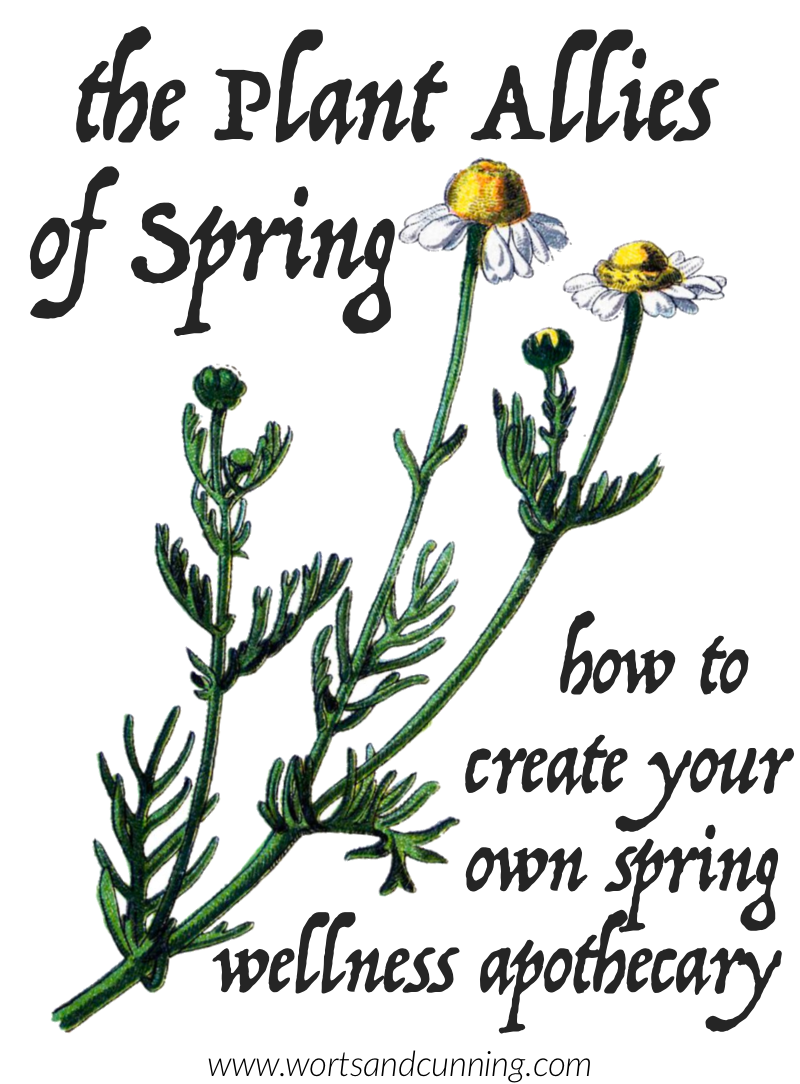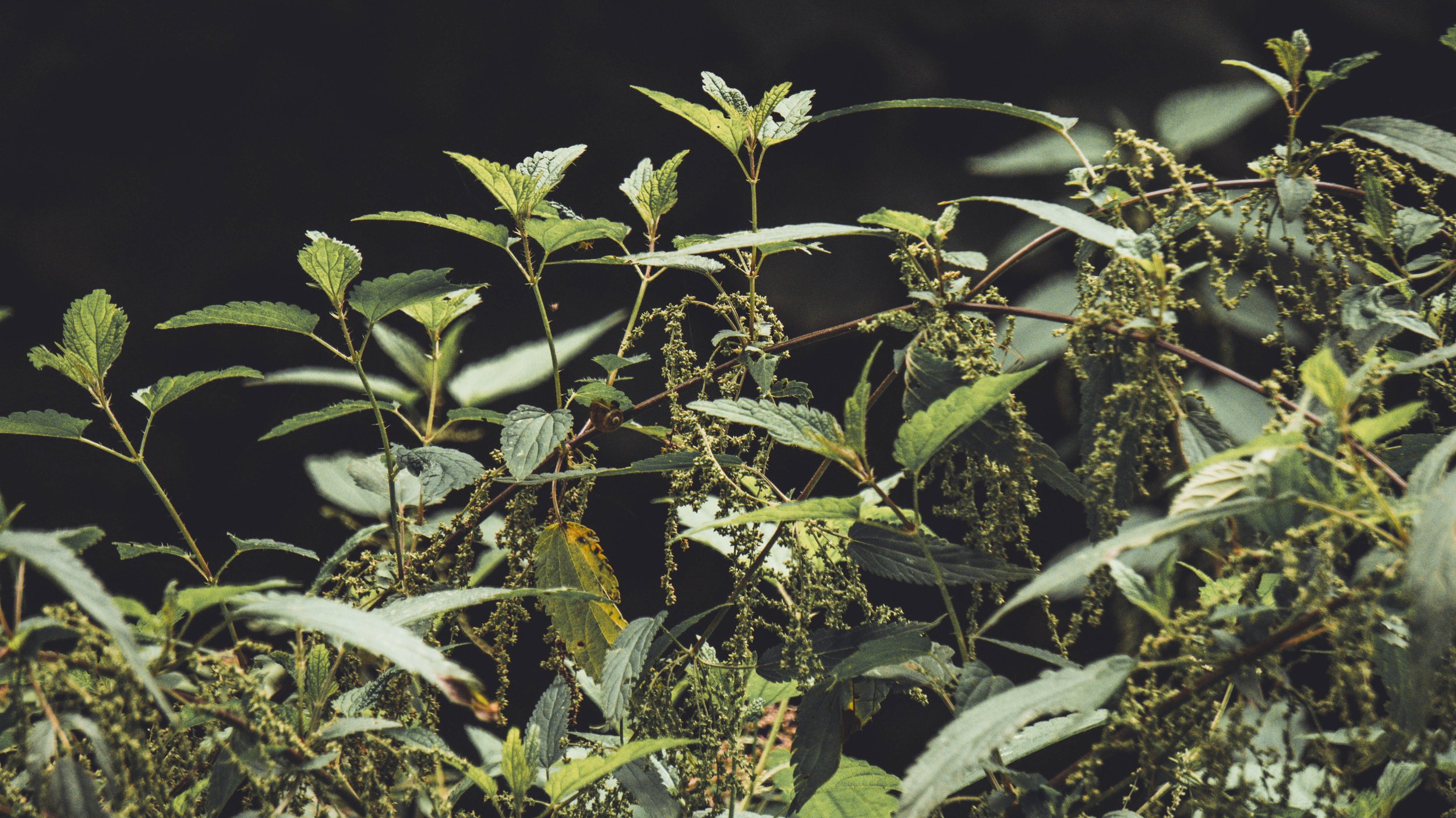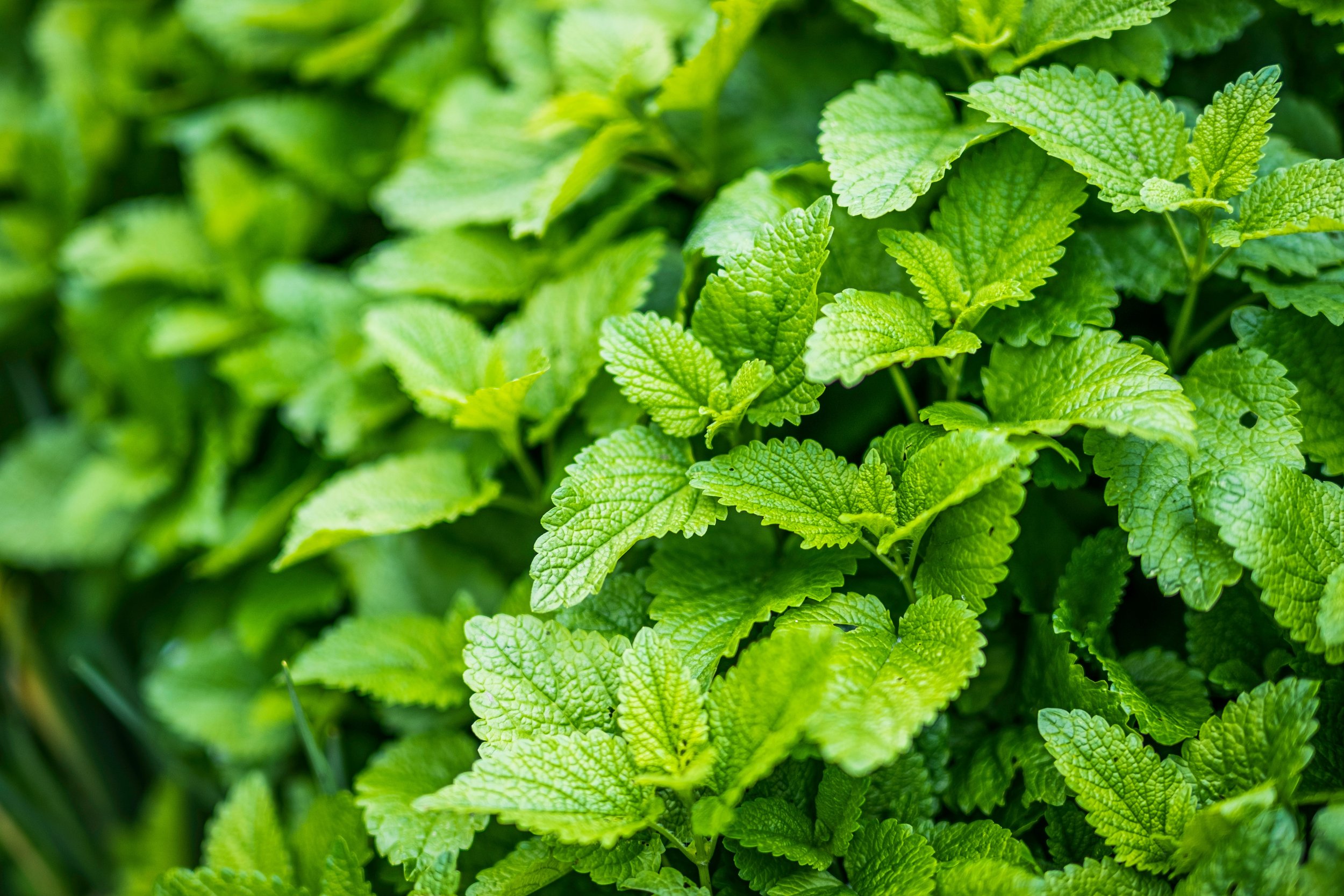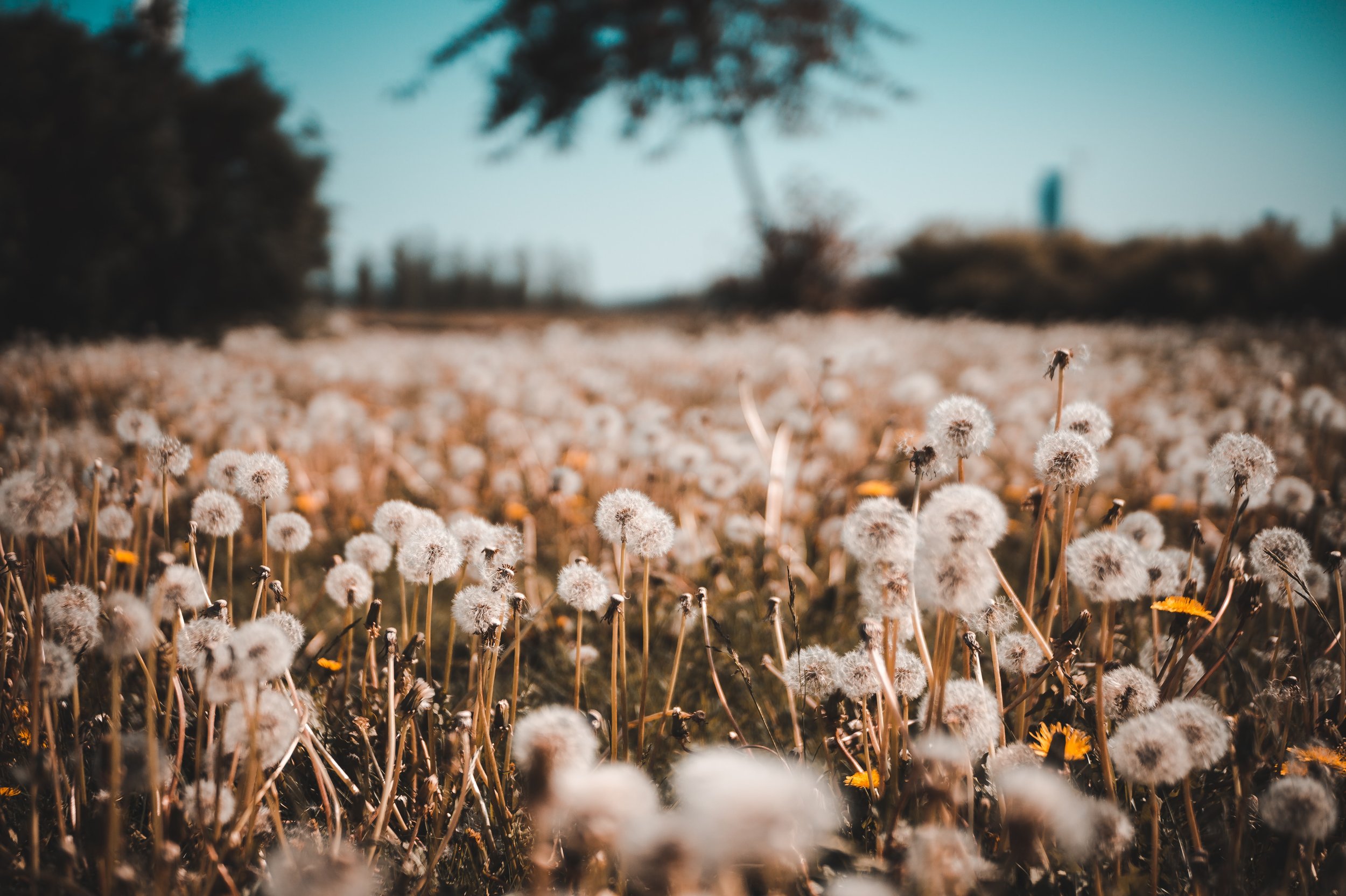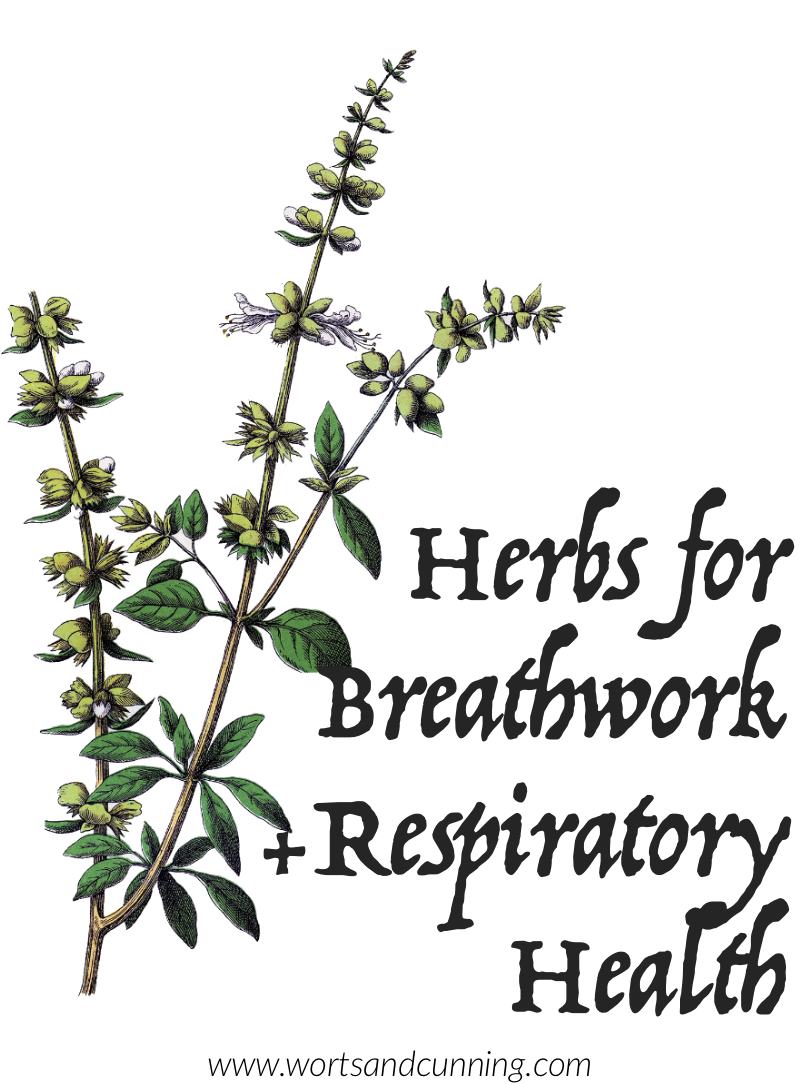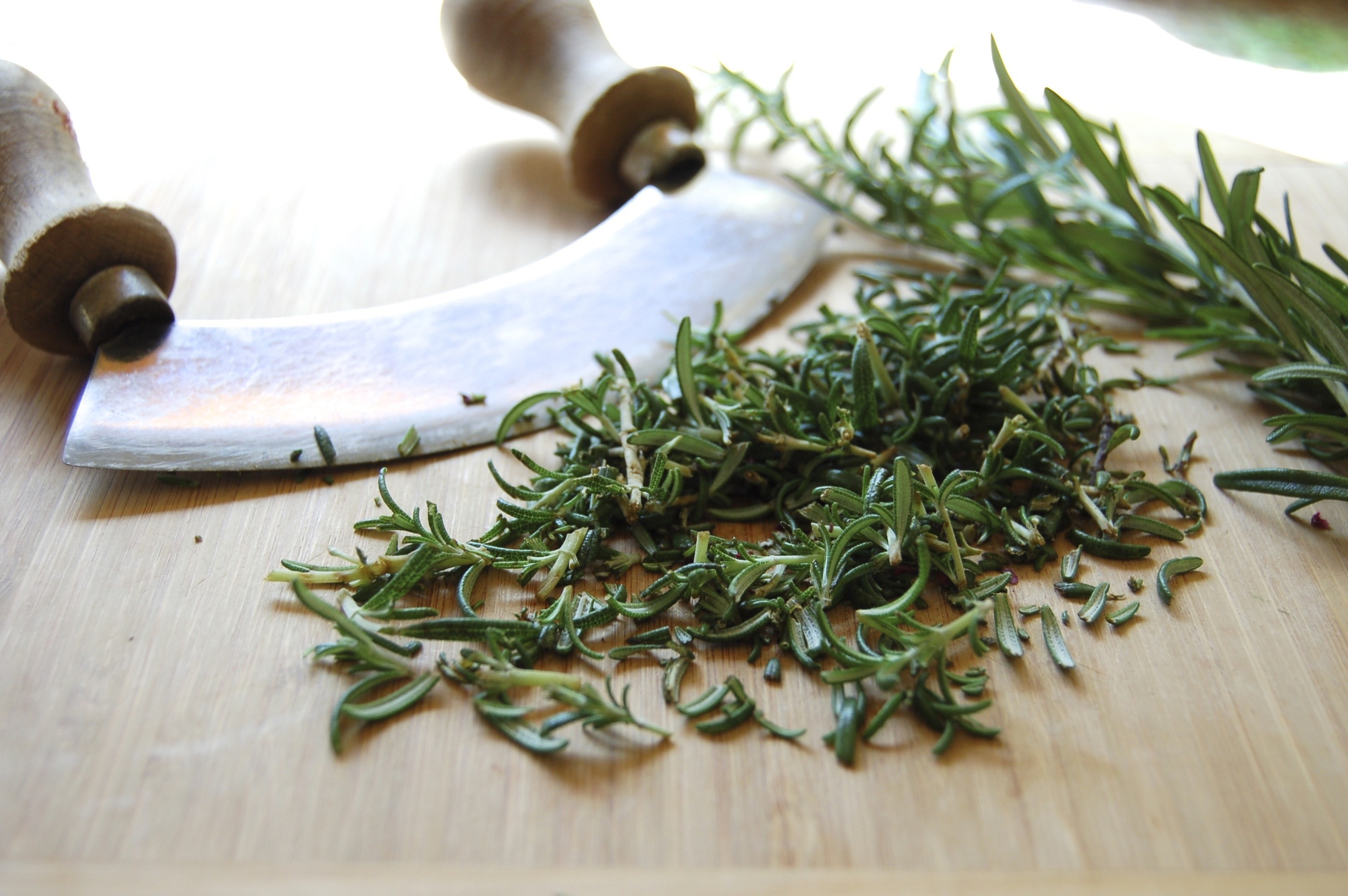The Plant Allies of Spring: How to Create a Spring Wellness Apothecary
Forever ago I wrote a blog post on creating your own herbal apothecary for the winter months, but it's not just winter that I'm adjusting what's on my apothecary shelves. Every season brings new needs and new herbs growing on the Land, so I thought it would be useful to write about creating home apothecaries for wellness for each of the seasons.
As with my winter wellness suggestions, I've organized my recommendations into general herbal actions that I find useful in the springtime such as anti-inflammatory herbs for allergies. I've tried to highlight herbs that are easy to access (especially in North America, where I am writing this from) and/or inexpensive to grow yourself, but hopefully you'll feel inspired and able to work with herbs local to your area.
So with that in mind let's explore some of the common ailments and remedies for the season of spring!
Finding Balance: Managing Seasonal Allergies
Herbal Actions: Anti-inflammatory, antihistamine, anti-catarrhal, and respiratory tonics
Here's my caveat about herbs and allergies: I do think that many folks benefit from working one-on-one with a local herbalist to help figure out your allergies and reactivity because a) allergies can be tricky to figure out and the individualized care a practitioner can offer can be essential, b) there are often layers of reactivity occurring (including food allergies and neuroplastic reactivity) that need exploring and c) a local herbalist can help you work with local herbs which is often very beneficial to alleviating allergies.
All that said, there are a lot of herbs that are generally useful for allergies and helping the body be less reactive and inflammatory during allergen abundant times like spring. The following herbs are protective against seasonal allergies, energize body systems, and generally help the body move from winter to spring.
Nettles (Urtica dioica): A nutritionally dense plant ally, Nettles is a great herb to work with in strengthening and nourishing our body. It has antihistamine qualities and helps to "build the blood" which speaks to both its iron content, but the herbs overall nutritive and energizing (but not stimulating) healing qualities.
Goldenrod (Solidago spp.): A beloved ally for helping to alleviate seasonal allergies, Goldenrod is adept at relieving congestion and sinus pain.
Lemon Balm (Melissa officinalis): A good tonic herb, known for bringing joy and life to those who ingest it. Lemon Balm helps to protect against overwhelm, whether that's feeling overwhelmed by change, social situations, spring allergies or whatever else is looming large in your life.
Peppermint (Mentha piperita): If you're feeling particularly sluggish this spring, turn to Peppermint to help sweep away the remaining drowsiness of winter so you can connect with the energy of the new season. The anti-inflammatory qualities of Peppermint help us to breathe deeper, reduce the brain fog that often come along with allergies, and infuse us with some hope that this too shall pass.
Dandelion (Taraxacum officinale): The arrival of Dandelion on the Land I live with is a time of celebration. There will be medicine that can be made again for the year ahead and enjoying Dandelion medicine during the early days of spring is like filling up the body with spring energy from the inside out. Dandelion helps to reduce sinus inflammation and expel excess mucus (along with the allergens it carries).
The Internal Fire: Nourishing Digestion
Herbal Actions: Bitters, cholagogues, anti-spasmodic, anti-inflammatory, carminatives, and nervines
One of the most important ways of supporting health from a traditional western herbalism perspective, is supporting the digestive fire (or metabolic processes) of the body. After the slowness of winter and the long stretch of cold, in the spring we want to support the building up of digestive effectiveness as we become more active and the days heat up. Finding the right digestive herbs for your constitution can take a bit of effort (which is why working with an herbalist one-on-one can be so valuable - you deserve such support), but when you find your digestive plant allies, it can be life changing.
Dandelion (Taraxacum officinale): The roots are a good overall spring tonic, helping to wake up our winter bodies to the season of spring. I like to drink a decoction of the roots during early spring (sometimes with a recipe like this) and enjoy making and taking my own whole plant Dandelion tinctures (i.e. the roots, leaves, flowers of Dandelion) to enjoy throughout the year.
Chamomile (Matricaria chamomilla): Another good overall spring to summer tonic and digestive aid, I especially like recommending Chamomile for highly sensitive people who tend to get upset stomachs when experiencing disruption to their day and routine (including struggling with the change of season). Chamomile is also a plant ally for folks who tend to have an overactive or fast digestion (may be indicated via signs of cramping, diarrhea, and gas).
Calendula (Calendula officinalis): Deeply reparative to the digestive system and often a good ally for folks who suffer from bloating, fatigue, and gas after meals.
Rose (Rosa spp.): A helpful ally when it comes to supporting the microbiome of our gut, acting as a prebiotic as well as supporting digestion through the promoting the production of bile.
Other digestive spring aids include Lemon Balm (Melissa officinalis), Peppermint (Mentha piperita), Ginger (Zingiber officinalis), Rosemary (Rosmarinus officinalis), and Sage (Salvia officinalis).
Waking Up From Winter: Brain Fog & Brain Tonics
Herbal Actions: Nootropics, nervines, and adaptogens along with herbs for digestive health to support the brain-gut axis.
The winter season has hopefully brought some much needed slowness and rest to your life. Just like getting up in the morning after a long night's sleep, waking up from the winter months can take a bit of time. I like to reach for herbs that support brain health and mental clarity, helping to sweep away the cobwebs of winter so that I can best enjoy the energy of spring.
Lemon Balm (Melissa officinalis): My favorite ally for alleviating brain fog and helping to promote mental clarity. It's also a plant ally known to bring joy and support our ability to feel part of the world and not be overrun by it - something which can feel especially useful between the slowness of winter and the speediness of spring.
Sage (Salvia officinalis): A classic brain tonic, Sage is known as an herb of wisdom, promoting mental clarity and discernment.
Milky Oat (Avena sativa): A great ally for those feeling exhausted and not ready to be doing much of anything, much less transitioning into a new season. A supremely generous tonic for the nervous system as well as supporting our mental health.
Other brain tonics include Gotu Kola (Centella asiatica), Gingko (Gingko biloba), and Ashwagandha (Withania somnifera).
Two Steps Forward, One Step Back: Springtime Colds & Fevers
Check out my winter apothecary post for recommendations on herbs for different types of colds, coughs, and fevers.
Breathing Deeply: Respiratory & Lung Health
Herbal Actions: Anti-inflammatories, demulcents, astringents, aromatic, and expectorants.
Honoring the breath is an important part of my personal and professional practice. I've written about breathwork and the herbs that support breathwork practices, all of which can be incorporated into a spring apothecary.
Yerba Santa (Eriodictyon californicum): If you have the sort of spring allergies which cause a lot of damp and mucus, drying Yerba Santa might be a good ally for you. It's a respiratory tonic and nervine helping us to connect deeply to our breath and nervous system.
Mullein (Verbascum thapsus): If you've had a long season of being sick this past winter, Mullein can be a great ally, especially if there is a lingering cough. I like combining Mullein with Elder (Sambucus nigra) and Peppermint (Mentha piperita) for a lung-opening, immunomodulating blend. A helpful ally for those whose asthma is irritated by the increase in heat and allergens that spring brings.
Elecampane (Inula helenium): A good herb for seasonal allergies and stubborn coughs of all sorts.
The Body In Motion: Supporting the Lymph Nodes
Herbal Actions: Lymphatic, alterative, anti-inflammatory, and astringent
Some of the first herbs to spring up after winter are ones that support lymphatic health, helping to drain congested lymphs and reduce overall inflammation. Often considered weeds by the general public, these herbs deserve respect and can be a beautiful and inexpensive way to access herbal medicine. Be sure to leave enough herbs to go to seed and continue to spread out across the Land to where they are most needed.
Cleavers (Galium aparine): These sweet and sticky herbs help to support the activity of white blood cells clearing out congestion in our lymph nodes. These are best taken fresh either as a tea or blended into smoothies.
Calendula (Calendula officinalis): If you're in a state of lymphatic congestion, Calendula can be a beautiful ally to work with. The bright flowers shine through our system, chasing out shadows of sluggishness, helping to promote lymphatic drainage and circulation.
Dandelion (Taraxacum offcinalis): Dandelion helps to repair and support the filtering systems of our body including our liver, kidneys, digestive tract, and lymph nodes. The herb helps to promote the production of lymphocytes which makes it a wonderful lymph tonic to work with throughout late winter and early spring.
Other lymph tonic herbs include Chickweed (Stellaria media), Echinacea (Echinacea purpurea), and Ocotillo (Fouquieria splendens).
🌿
There you have it friends - herbal allies for the spring season! I hope you're feeling inspired to build your own home apothecary using a few easily accessible herbs to support your health and the health of those you serve. In my own life, spring is a time of trying to use up last year's stock of herbal remedies so that I can make space for new ones, long and lovely hours in the garden, checking in with the energy of the season, and working all sorts of springtime magick.
You can also learn about the seasons from an astrological perspective, starting with Aries. If you’re in the southern hemisphere the start of spring is marked by Libra.
I hope that you find the rhythm of seasonal change that works the best for you and your loved ones, so that you can thrive in times of change and feel nourished by the possibility of what is coming into being.
This post was made possible through patron support.
❤︎ Thanks, friends. ❤︎

